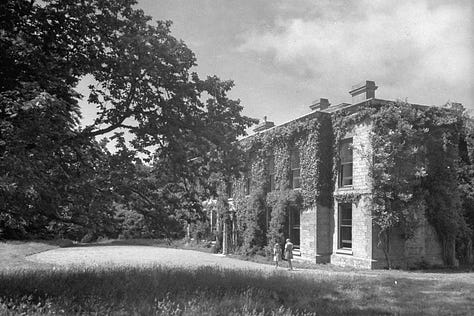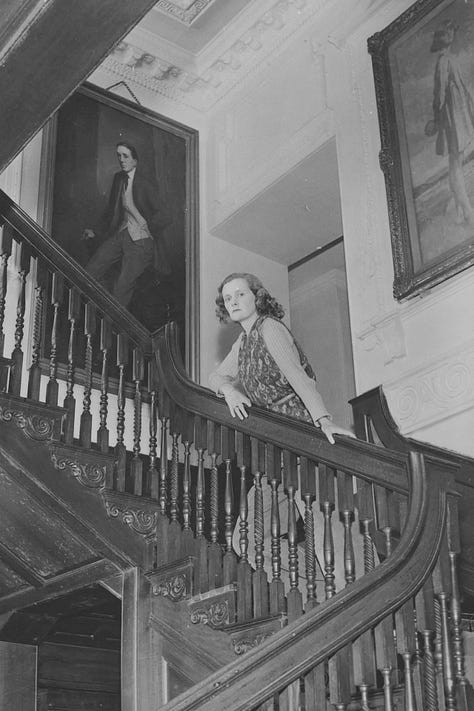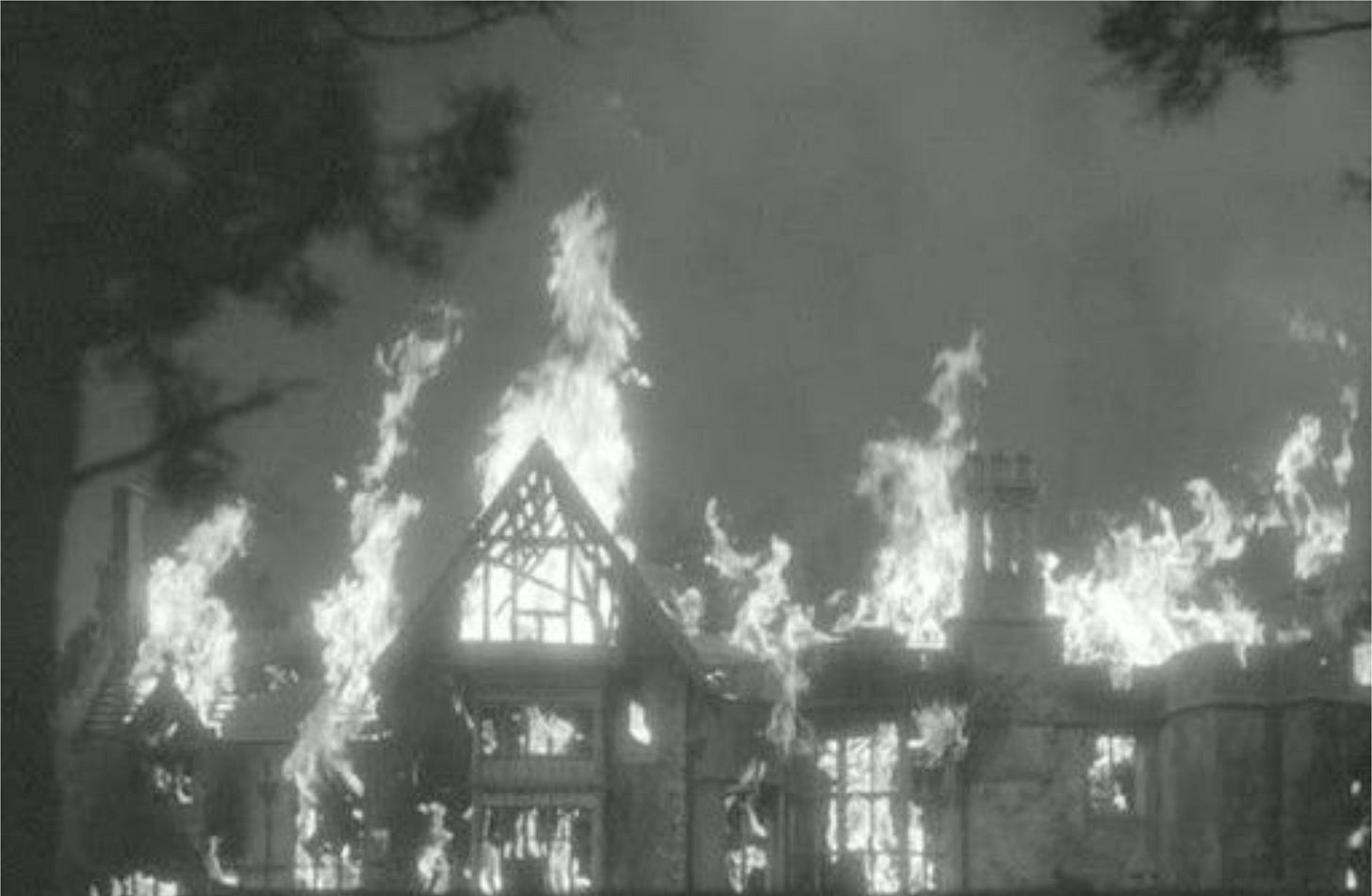


GOTHIC: of or relating to a style of fiction characterized by the use of desolate or remote settings and macabre, mysterious, or violent incidents.
I first met “Rebecca” as a young woman, possibly in my teens. I think I read the book first, although the Hitchcock film is so vividly remembered that it’s hard to tell. I do know that I read it as a love story. The main character, who’s surname is never given (due to Du Maurier’s not being able to think of one), is easily relatable. She’s smart, but insecure. She’s young but not entirely ignorant of the world. She’s unfortunate, born to upper-middle class, orphaned with no means, forced to find work. She’s working (in training!) as a paid companion to an odious woman. And then she meets Maxim.
Reading it now, as a young-looking senior (or so the clerk at Goodwill told me yesterday), different things pop out at me. Such as the narrator’s description of Maxim:
“He belonged to a walled city of the fifteenth century, a city of narrow, cobbled streets, and thin spires, where the inhabitants wore pointed shoes and worsted hose. His face was arresting, sensitive, medical in some strange inexplicable way…Could one but rob him of his English tweeds, and put him in black, with lace at his throat and wrists, he would stare down at us in our new world from a long distant past–a past where men walked cloaked at night, and stood in the shadow of old doorways, a past of narrow stairways and dim dungeons, a past of whispers in the dark, of shimmering rapier blades, of silent, exquisite courtesy.”
Wow! I bask in the beauty of the prose both as a reader and a writer. How she brings us not only a physical description of the man, but where he would lurk, and what he’d do there, ending on the current day action that brought him to the forefront of her attention, his exquisite courtesy.
In this reading I was keenly aware of the inequities of their ages and experience and upbringing. Poor woman, no wonder she becomes not in love with him, but infatuated by him; his looks, his house, and his sad air of mystery. As she learns tiny piece by tiny piece of his recent history, she attributes the sadness to love. He loved Rebecca. Rebecca was beautiful, perfect in so many ways, and he desperately misses her.
Another thing I also noticed this time, is how our narrator is very much in love with Manderley. This is, of course, colored by my reading of Du Maurier’s life and Menabilly, the inspiration for Maxim’s home. As a child, Du Maurier vacationed in Cornwall and heard about a beautiful abandoned home which wasn’t easily found. She convinced her sister to brave the long drive covered with debris (the same drive she describes so beautifully in the beginning of Rebecca) in order to find it. I seem to recall it took more than one trip to find the house, and so already it was embedded in her imagination and in her heart.



As Daphne later wrote:
“Perhaps it is wrong to love a block of stone like this, as one loves a person. It cannot last. It cannot endure. Perhaps it is the very insecurity of the love that makes the passion strong. Because she is not mine by right. The house is still entailed and one day will belong to another.”
Some years after writing “Rebecca” (in Egypt and Cyprus where her husband was stationed), she wrote to the Rashleigh family to see if she could lease Menabilly, believing it was a fool’s errand. As mentioned, the house was (and still is) owned by the Rashleigh family and could not be sold. But the owners were happy to lease it, Du Maurier paying for the upgrades and repairs, and so she got to live in her beloved house for many years. A living fairy tale.
Back to my recent reading of Rebecca (spoiler alert! If you’ve somehow missed the book and filmed adaptations, please stop reading here, and get thee to a library! The book is a wonderful read.)
I was surprised to realize one of the pivotal events of the story happens close to the middle of the book. I have always loved the narrator, first for her relatable, if painful, awkwardness, then for her strength and will borne out in the second half. The narrator surprises her husband with a costume copied from an ancestral portrait for their celebratory ball, his anger revealing it was identical to one Rebecca wore. (All thanks to Mrs. Danvers.) Our heroine is so distraught she is prepared to leave Maxim, even to die, when a scuttled sailboat is discovered on the bottom of their cove. And inside is the body of Rebecca.
In quick succession the narrator discovers two things, first that the obstacle between her and Maxim was never his undying love of Rebecca, but the fact he’d murdered her. And the second thing, that completely blotted out the first, was that he’d never loved Rebecca in the first place. The narrator’s heart is “light as a feather” realizing that all the time when she believed she fell short in comparison, he was not comparing her at all. With her newfound confidence, she quickly tells him what to do, how to act in order not to be suspected and prosecuted for Rebecca’s death.
From here on it reads like a whodunnit (despite the fact we know), with clues compounding clues and a surprising doctor’s diagnosis which, at least in the coroner’s mind, exonerates Maxim.
And so we end the book on something we already knew from the opening pages, we end on Mrs. Danvers’ revenge. The burning of Manderley.
Hope you’ve enjoyed this trip to Manderley/Menabilly. I’ve just discovered one can rent a cottage on the estate. Keep your eyes peeled here and if we make a trip to Cornwall, I promise to include pictures!





